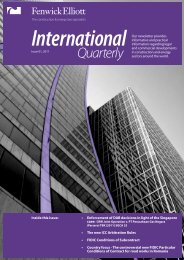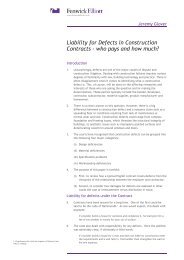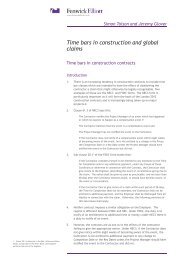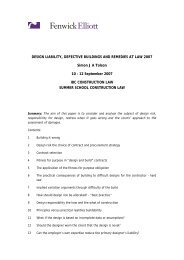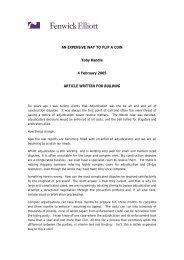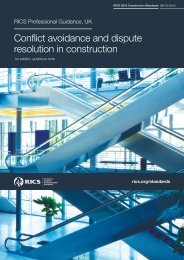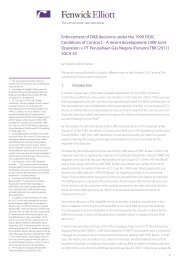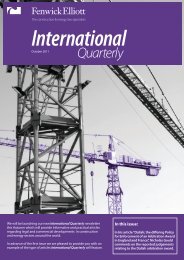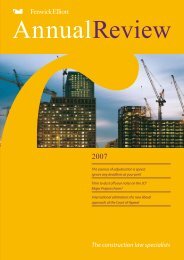Standard forms: JCT 2005, NEC3 and the Virtual ... - Fenwick Elliott
Standard forms: JCT 2005, NEC3 and the Virtual ... - Fenwick Elliott
Standard forms: JCT 2005, NEC3 and the Virtual ... - Fenwick Elliott
You also want an ePaper? Increase the reach of your titles
YUMPU automatically turns print PDFs into web optimized ePapers that Google loves.
<strong>St<strong>and</strong>ard</strong> <strong>forms</strong>: <strong>JCT</strong> <strong>2005</strong>, <strong>NEC3</strong> <strong>and</strong> <strong>the</strong> <strong>Virtual</strong> Contract<br />
www.fenwickelliott.co.uk<br />
Clause 6.1 is effectively a bar to any claim should <strong>the</strong> contractor fail to notify <strong>the</strong> project<br />
manager within 8 weeks of becoming aware of <strong>the</strong> event in question. The old formulation<br />
of a 2 week period for notification has been replaced with an 8 week period, but with highly<br />
onerous consequences for a contractor. This clause must also be read in conjunction with<br />
clause 60.1(18) which states that a compensation event includes:<br />
“A breach of contract by <strong>the</strong> Employer which is not one of <strong>the</strong> o<strong>the</strong>r compensation<br />
events in this contract.”<br />
Clause 61.3, <strong>the</strong>refore, effectively operates as a bar to <strong>the</strong> contractor in respect of any time<br />
<strong>and</strong> financial consequences of any breach of contract if <strong>the</strong> contractor fails to notify.<br />
The courts have for many years been hostile to such clauses. In more modern times, <strong>the</strong>re<br />
has been an acceptance by <strong>the</strong> courts that such provisions might well be negotiated in<br />
commercial contracts between businessmen. 18<br />
The contractor must of course be “aware of <strong>the</strong> event” in order to notify <strong>the</strong> project<br />
manager under clause 61.3. There will no doubt be arguments about when a contractor<br />
became aware or should have become aware of a particular event, <strong>and</strong> also <strong>the</strong> extent of<br />
<strong>the</strong> knowledge in respect of any particular event. Ground conditions offer a good example.<br />
Initially, when a contractor encounters ground conditions that are problematic, he may<br />
continue to work in <strong>the</strong> hope that he will overcome <strong>the</strong> difficulties without any delay or<br />
additional costs. As <strong>the</strong> work progresses <strong>the</strong> contractor’s experience of dealing with <strong>the</strong><br />
actual ground conditions may change such that <strong>the</strong> contractor reaches a point where<br />
he should notify <strong>the</strong> project manager. The question arises as to whe<strong>the</strong>r <strong>the</strong> contractor<br />
should have notified <strong>the</strong> project manager at <strong>the</strong> date of <strong>the</strong> initial discovery, ra<strong>the</strong>r than<br />
at <strong>the</strong> date when <strong>the</strong> contractor believes that <strong>the</strong> ground conditions are unsuitable. The<br />
answer must be that <strong>the</strong> contractor should give notice when he encounters ground<br />
conditions which an experienced contractor would have considered at <strong>the</strong> Contract Date<br />
to have had only a minimal chance of occurring <strong>and</strong> so it would have been unreasonable<br />
to have allowed for <strong>the</strong>m in <strong>the</strong> contract price having regard to all of <strong>the</strong> information that<br />
<strong>the</strong> contractor is to have taken into account in accordance with clause 60.2. 19<br />
A fur<strong>the</strong>r question arises in respect of clause 61.3, <strong>and</strong> that is who precisely needs to be<br />
“aware”. Is it <strong>the</strong> person on site working for <strong>the</strong> contractor, <strong>the</strong> contractor’s agents or<br />
employees or is it <strong>the</strong> senior management within <strong>the</strong> limited company organisation of <strong>the</strong><br />
contractor? Case law suggests that it is <strong>the</strong> senior management of <strong>the</strong> company <strong>and</strong> not<br />
merely servants <strong>and</strong> agents. 20<br />
18 See for example Photo Production Limited<br />
–v- Securicor Limited [1980] AC 827.<br />
19 Clause 60.2 deals with physical conditions.<br />
20 HL Bolton Engineering Co Limited –v- TG<br />
Graham & Sons Limited [1956] 3 ALL ER 624, in<br />
particular <strong>the</strong> judgment of Denning LJ.<br />
21 (2000) 16 BCL 449.<br />
The prevention principle considered elsewhere in this paper may also apply in respect<br />
of any employer’s claim for liquidated damages. If <strong>the</strong> contractor does not make a claim,<br />
<strong>the</strong>n <strong>the</strong> project manager cannot extend <strong>the</strong> Completion Date under <strong>NEC3</strong>, <strong>and</strong> so an<br />
employer will be entitled to liquidated damages. However, those liquidated damages<br />
could be in respect of a period where <strong>the</strong> employer had caused delay. The employer can<br />
only recover losses for delay in completion for which <strong>the</strong> employer is not liable.<br />
It might be said that <strong>the</strong> true cause of this loss was in fact <strong>the</strong> contractor’s failure to issue a<br />
notice. However, judgements such as <strong>the</strong>y are divided. The case of Gaymark Investments<br />
Pty Limited –v- Walter Construction Group 21 is a decision of <strong>the</strong> court of <strong>the</strong> Nor<strong>the</strong>rn Territory<br />
of Australia. That decision follows <strong>the</strong> English case of Peak –v- McKinney holding that<br />
17



